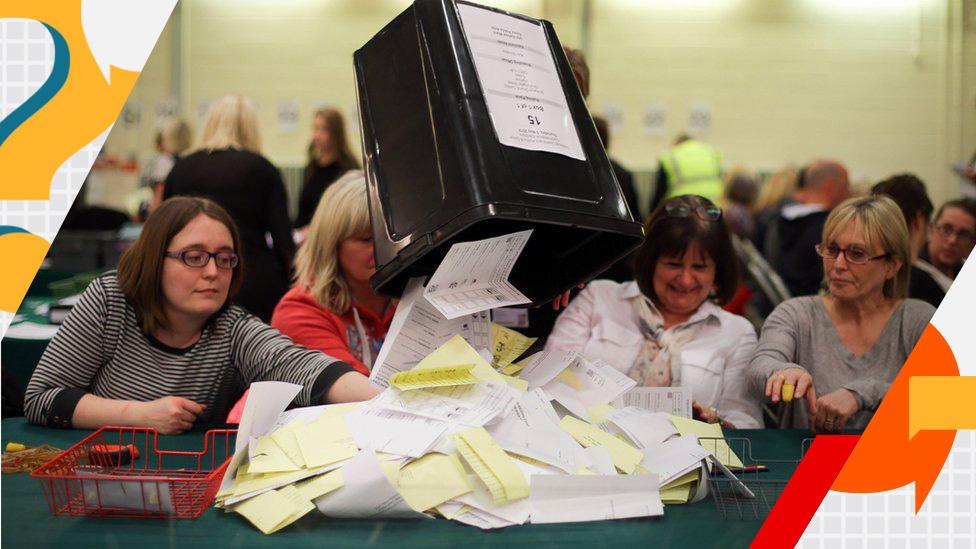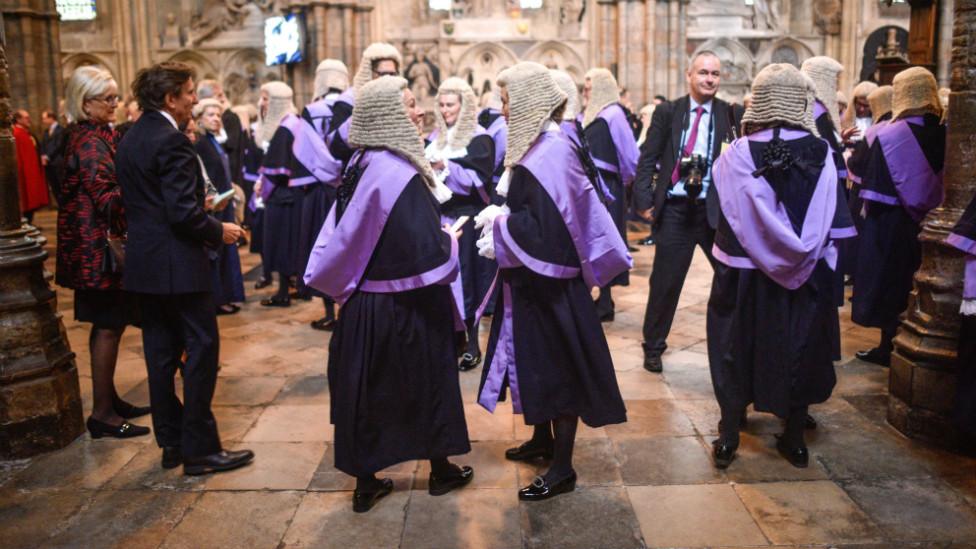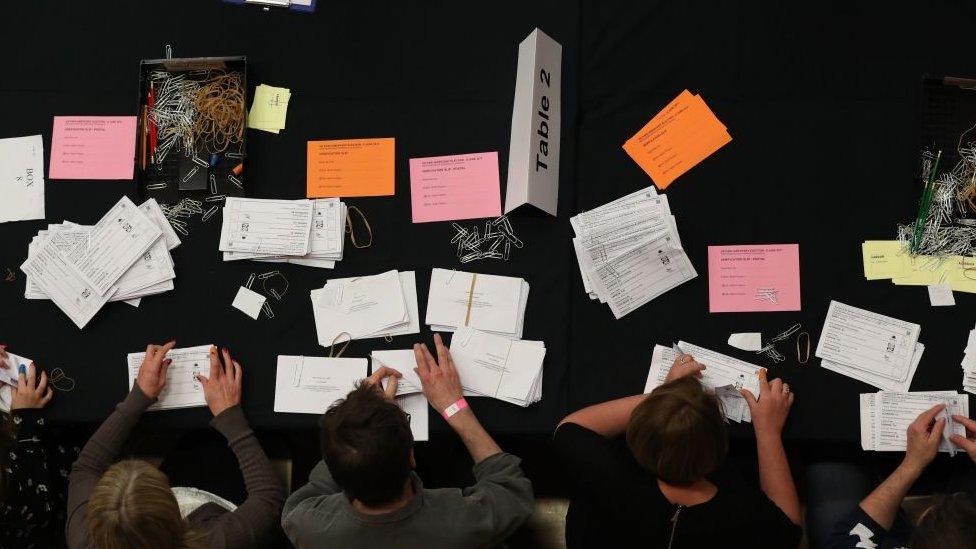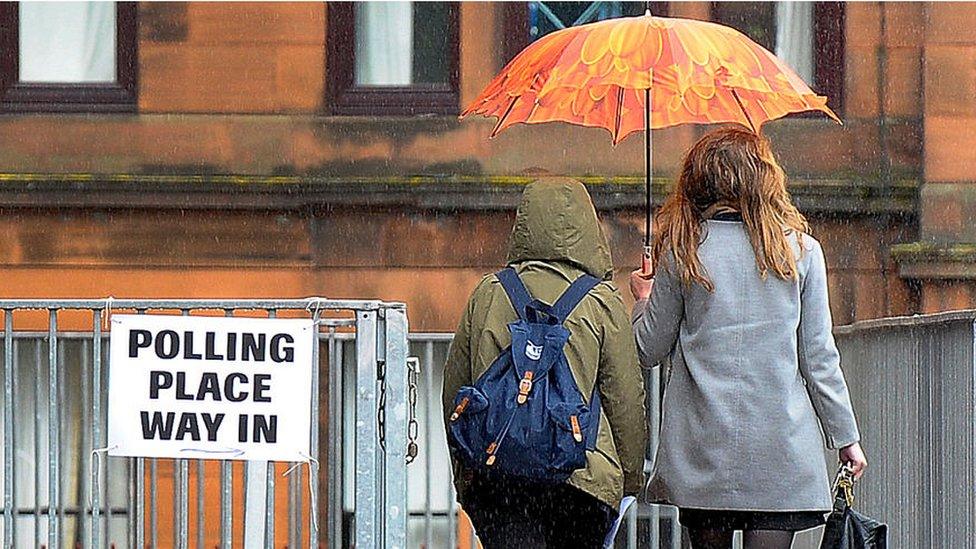Election 2019, Your Questions Answered: Who can stand for election?
- Published

Parliament has broken up and the election campaign is under way. But what does that mean and how is it organised?
Here are our answers to just some of the questions we have received from readers.
Can I be in the hall and watch people counting the ballots? - Manuel Mora, North London
Candidates standing in the election, their campaign agents and official observers registered in advance with the Electoral Commission are entitled to witness the vote count taking place.
In theory, members of the public may also view the vote count if they have applied to their local authority in advance.
If the authority decides they have the capacity for the individual to attend they will do so as a guest of the returning officer.
Everyone present at the vote count will be issued with a ticket or entrance pass. They must maintain the secrecy of the vote and ensure the votes are not tampered with.
If I have a postal vote, can I still vote in person? - Anna Bennett, Torquay
If you decide you don't want to post your ballot, or you miss the deadline, you can hand in your postal vote at your registered polling station.
But you can't vote in person in the polling booth.
If you want to cancel your postal vote you can contact your local authority.
How do I know that my postal vote has been received and not altered? - Mark Stolarek, Kirkcaldy
To prevent fraud and ensure that every person votes only once, each ballot paper carries a unique identification number as well as a unique official mark. At the polling station, each voter's voter registration number is checked off against the unique number on the ballot paper.
So, although UK elections are supposed to be secret, it is theoretically possible to link each vote to the person who cast it. However, it is illegal to do so.
After an election all ballot papers and connected paperwork are sealed and stored for a year, before being destroyed. They can only be opened by order of the House of Commons or the High Court.
Is the number of MPs stepping down at this election higher than usual? - Louise Gregory, Kendal
The number of MPs who decide to retire or stand down from Parliament before a general election varies widely.
By Tuesday evening, 66 MPs had indicated that they will not be seeking re-election this time.
This compares to an average of just under 86 MPs who stood down at 10 previous general elections, beginning in 1979.

Our question-askers (clockwise from top left):, Andrew Burgess, Alastair Somerville, Louise Gregory and Kate Siddall
Do MPs still get paid during the election period, and do they have to do any work? - Andrew Burgess, Pudsey
MPs are no longer MPs once Parliament is dissolved. They are ordinary members of the public with no special privileges. That is because every seat in the House of Commons is now up for grabs.
However, they continue to receive their salary, external, currently £79,468 a year, up to and including polling day. If they have chaired a select committee, the extra payment they get for doing that job stops on the day Parliament is dissolved.
They are under no obligation to do any work during this period and their parliamentary passes are locked out. But they can keep abreast of urgent casework via parliamentary email.
When do we find out who our local candidates will be? How long does it take to select a new candidate? Gavin Butler, Gerrards Cross.
The deadline for all candidates to apply, whether attached to a party or independent, is 14 November.
Different parties have different methods of choosing candidates. In essence, they are drawn from a centrally-approved candidates' list, with the final decision made by local party members.
The time taken to select a candidate varies but, if time is short, the national bodies of the main political parties can impose a candidate on a constituency party.
What restrictions are there on candidates standing for election? - Pete Jinks, Runcorn
According to the Electoral Commission,, external all candidates must be at least 18 years old on the day they are nominated, and must be a British, Irish or eligible Commonwealth citizen.
A wide range of people are not allowed to stand, external because their job or role is seen as being incompatible with being an MP. These include members of the House of Lords, civil servants, military personnel and judges. Members of the European Parliament cannot stand for the Westminster parliament and no-one can stand in more than one constituency.
Prisoners serving a custodial sentence after conviction cannot vote in any elections. The same applies to some people who are subject to bankruptcy orders or proceedings, although bankruptcy in itself is not a disqualification.

Judges are barred from standing at general elections
How much does it cost to stage a general election? - Francis Klonowski, Rothwell
The 2017 election cost taxpayers £140m., external Seventy-five parties and 15 campaign groups reported spending £41.6m, external between them.

The general election explained

How much does a returning officer get paid? - Kate Siddall, Horsforth
A returning officer - who is ultimately responsible for the election for the entire constituency or constituencies they are appointed to - earned between £2,500 and £4,343 in 2017. Their fees, external are set by the government. A presiding officer, responsible for the polling station throughout the day, is paid between £200 and £300.
Can a suspended MP stand for re-election in a general election? - Richard Allen, Lewannick
An MP suspended by the Commons can stand in any by-election or general election.
But this would probably have to be as an independent candidate, because they would almost certainly lose the party whip. However, in theory there is nothing stopping a party choosing them as the candidate.
If the MP has yet to serve the suspension before an election it rolls over to the next parliamentary session, assuming they win the election.
Why can't the electoral process be brought into the 21st Century and have online voting? - David Zech, Farnham

The UK still votes and counts votes by hand, unlike Estonia, where internet voting is allowed in parliamentary elections
In 2007 Estonia became the first, and so far only, country to introduce the option of internet voting for parliamentary elections. At its 2019 general election, 43.8% of voters there used this option.
As regards the UK, in 2015, the Speaker's Commission on Digital Democracy, external, made up of MPs and others from a "range of relevant professions and backgrounds", recommended that "by 2020, secure online voting should be an option for all voters".
However, parliamentary legislation has not yet been proposed, with the question of security being cited as one reason this system has not been adopted.
Will Brexit negotiations continue during the pre-election period? - Alastair Somerville, London
No. The UK government and EU have an agreement for the terms of departure and so there is nothing new to negotiate during the run-up to the election. And trade talks can only start after the UK has left.

What questions do you have about the general election?
In some cases your question will be published, displaying your name and location as you provide it, unless you state otherwise. Your contact details will never be published. Please ensure you have read the terms and conditions.
Use this form to ask your question or get in touch using #BBCYourQuestions:
If you are reading this page and can't see the form you will need to visit the mobile version of the BBC website to submit your question.
- Published6 December 2019

- Published30 October 2019

- Published11 December 2019
